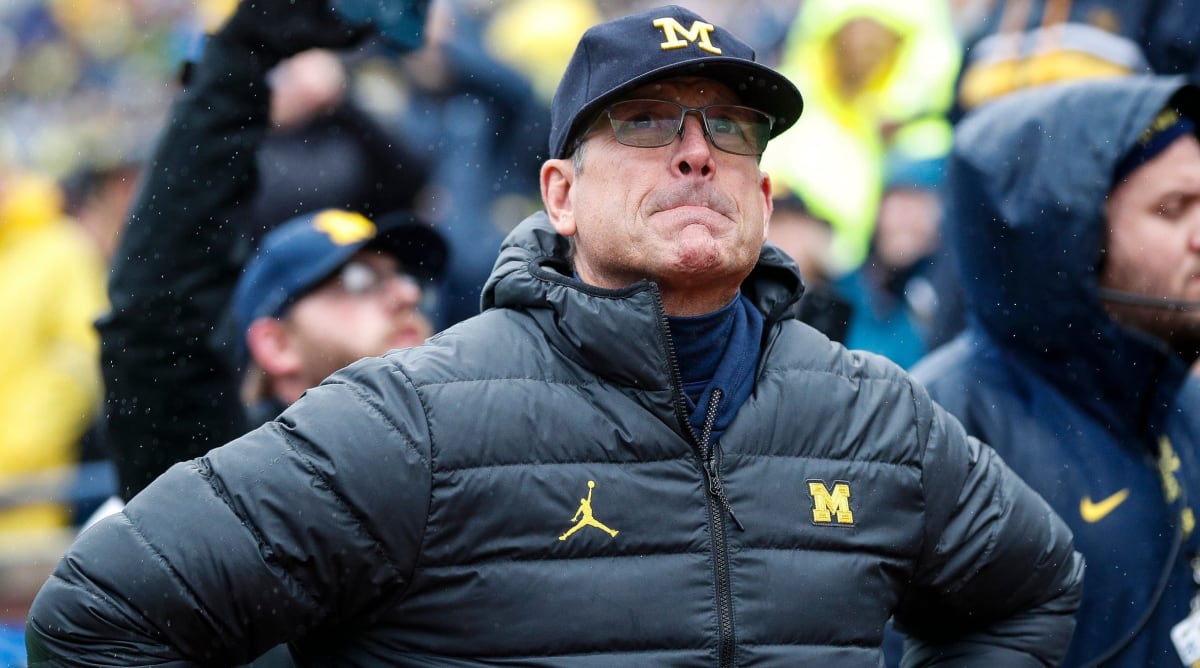The sign-stealing allegations against Michigan are serious, and time and evidence will answer some of the questions—though probably not all. Did the NCAA’s “person of interest,” now-suspended analyst Connor Stalions, break rules on orders from above, or did he go rogue? If it was from above, then how far above? Who paid for the system? (The most important question, how much Michigan benefited, will also be the hardest to answer, because it will likely be subjective.)
As Sports Illustrated’s Richard Johnson reported this week, Stalions believed he had a plan that would make him Michigan’s head coach someday. I don’t love his chances at the moment, but hey, it’s college football. You never know.

Junfu Han/USA TODAY NETWORK
That story is still unfolding, and it is not clear where it will go. I have found nothing in the NCAA rule book that hints at what an appropriate punishment might be. Schools are generally ordered to vacate wins only if they used ineligible players; there are no rules for ineligible play calls.
Michigan coach Jim Harbaugh has explicitly denied ordering or knowing about the activities in question. To this point, at least, none of the excellent reporting on the issue has contradicted him. Again: We will learn more. But this is a good time to talk about one of the most pervasive myths in college football.
The coach knows everything that happens in his program.
The myth goes back to the age when football coaches were not just portrayed as autocrats but often glorified for it. Coaches of that era often implemented rules that were more about exerting authority than anything else: Nobody can grow facial hair; freshmen cannot talk to the media until they play in a game; everybody must live in the same dorm; if you’re not five minutes early, you’re late.
Some of them promulgated the myth. The reason was partially tactical: Parents of recruits were more likely to trust a coach who knew everything that was happening on campus, and players were more likely to behave if they thought somebody was always watching. But the myth was also a way for coaches to comfort themselves.
Players breaking laws? Boosters breaking rules? Tutors doing homework?
I would know.
Really? Who would tell them?
Football coaches are notorious control freaks. Often, that is why they became coaches: to bring order to an entropic world. Assign everybody specific tasks, drill them on those tasks and success will follow. But even in the most civilized society, order is often an illusion.
A 2011 study found that the more parents monitored their children, the less likely they were to know if their kids were drinking alcohol. The reason: “When parents make efforts to monitor their child’s behavior, they may have a false sense of security. That is, these parents may assume that they know what their child is doing and believe that their current level of monitoring protects their child. However, they actually may be less vigilant and less aware of their child’s substance use and problems because of this assumption.”
Theft can be the difference between a store turning a profit and going out of business, yet the National Association for Shoplifting Prevention reports that shoplifters say they are caught, on average, 2% of the time; chronic offenders say they are arrested just 1% of the time. Spouses have affairs without getting caught. Former Internal Revenue Service chief Charles Rettig has estimated that the U.S. corporations and citizens get away with $1 trillion worth of cheating on their taxes every year.
In an anonymous survey, a quarter of last year’s Harvard graduating class admitted to academic cheating. The median class size at Harvard is 12 students. Alabama’s football program has more than 100 players and almost 50 full-time employees. Yet we are supposed to believe Nick Saban knows everything that happens in his program and still has time to sell insurance.
The myth is so pervasive that whenever there is wrongdoing in college sports, the public’s default assumption is that the head coach knew about it—unless, of course, the head coach in question is their own and he is winning, at which point he can do no wrong.
Long ago, the NCAA codified the myth. NCAA bylaw 11.1.1 says “an institution’s head coach is presumed to be responsible for the actions of all institutional staff members who report, directly or indirectly, to the head coach” and that the coach “shall monitor” all of those staff members. The purpose of the bylaw is noble: to stop coaches from forcing underlings to take the fall for them. But it presumes what should not logically be presumed.
Sometimes coaches order somebody to do something unethical, sometimes they have no idea and sometimes they go out of their way to not know. Some coaches are intensely demanding about winning and insistent about following the rules—and sometimes that leads to staffers trying to please their bosses without telling them how they did it. Head coaches can have all sorts of traits—brilliant, stubborn, idealistic, cynical, delusional, innovative, principled, Machiavellian, empathetic—but not one of them is omniscient.







